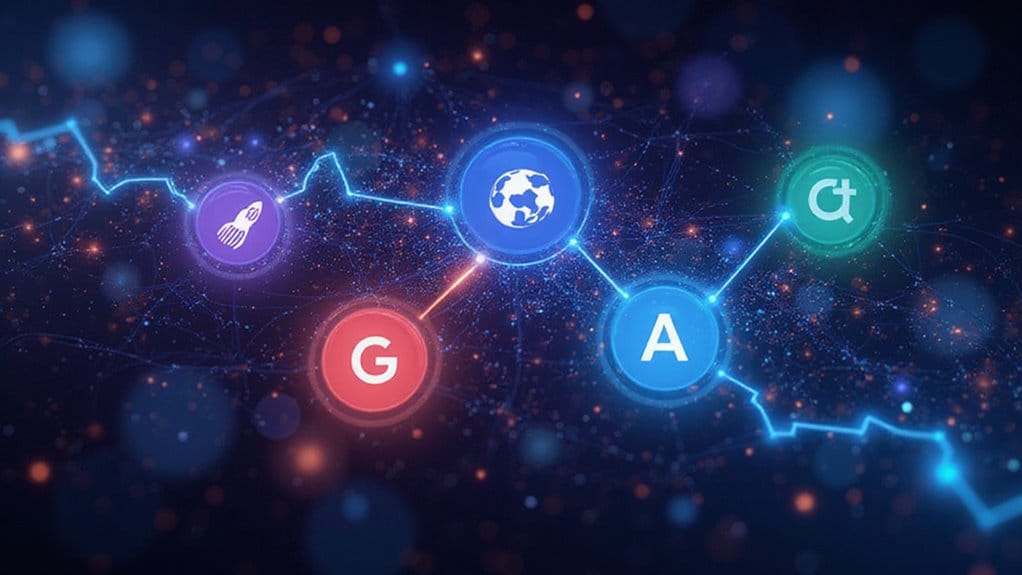The future of artificial intelligence professionals is anything but dull—if you want to survive, you’d better adapt! Skills in programming, data analysis, and communication are must-haves. Expect to combine creativity with tech prowess. Automation is here, folks, and it might just snatch away those mundane tasks. Be ready to manage AI systems and tackle ethical issues. Stay updated, or risk becoming obsolete. Buckle up, because the AI landscape is shifting fast, and there’s so much more to uncover!

What does the future hold for AI professionals in a world increasingly driven by technology? The landscape is shifting rapidly, creating exciting new AI career paths. Professionals keen to immerse themselves in this field must adapt their AI skillsets to keep pace with the demands of an evolving job market. With companies scrambling to implement AI solutions, the need for qualified experts is skyrocketing.
Imagine a world where mundane tasks are automated. Routine jobs? Gone! This opens doors for more complex, fulfilling work. However, it requires a new breed of professionals—hybrid experts who can blend creativity with technical prowess. AI trainers and sustainers will soon be in high demand, making their mark in sectors like healthcare and finance. AI technology could automate 60-70% of employees’ work activities, further emphasizing the shift in job requirements. This transformation is reminiscent of the Fourth Industrial Revolution, where AI, robotics, and IoT reshape the job landscape.
But hold on! The challenges are real. The rapid evolution of AI technology means that staying updated is not just a nice-to-have; it’s essential. Ethical concerns pop up like weeds in a garden. Professionals must navigate these tricky waters while addressing potential biases in AI systems, making a strong understanding of AI concepts crucial.
So what skills should aspiring AI professionals focus on? Start with programming languages and data analysis. Get comfortable with complex algorithms and machine learning models. And don’t forget about communication—being able to explain AI-driven decisions is a game-changer.
Now, don’t get too cozy. Continuous learning is the name of the game. The regulatory environment is constantly changing, and it can affect how quickly AI is adopted. As new professions emerge, those who can adapt will thrive.
The future of AI professionals is bright, but it’s not without its hurdles. Embrace the challenges, cultivate your skills, and remember: the world of AI is your oyster—if you’re willing to work for it! Stay ahead of the curve, or risk being left in the dust.
Frequently Asked Questions
What Skills Are Most Valuable for Future AI Professionals?
In a world increasingly driven by technology, mastering machine learning and data analysis is non-negotiable for future professionals.
Seriously, if you can’t interpret data, good luck making decisions! Learn algorithms that help machines learn, and get comfy with numbers; they’re your new best friends.
Don’t forget coding—languages like Python are essential.
How Will AI Impact Job Availability in Other Fields?
AI isn’t just transforming tech; it’s shaking up job markets across the board!
Expect AI job displacement in routine-heavy sectors like manufacturing and customer service.
But don’t panic—new job creation will emerge, especially in healthcare and education.
Want to thrive? Focus on critical thinking and adaptability.
Embrace lifelong learning, because those who don’t might just find themselves on the wrong side of the job market.
Stay ahead, or get left behind!
Are There Ethical Concerns With AI Professional Roles?
Yes, there are significant ethical concerns surrounding AI professional roles.
Consider AI accountability frameworks—these are essential for ensuring responsible AI use. Without them, who’s to blame when things go wrong?
Then there’s ethical algorithm design; if biases sneak in, discrimination can thrive.
Remember, folks, transparency isn’t just nice; it’s necessary. So, demand clear explanations!
Embrace rigorous standards and keep those algorithms in check—because ethical AI isn’t just a buzzword; it’s a must-have!
What Educational Paths Lead to a Career in AI?
To kickstart a career in AI, one must embrace educational paths that include a bachelor’s in computer science or engineering.
Want to explore deeper? Consider a master’s or Ph.D. for advanced roles.
Learn machine learning and data science—vital skills, people!
Master programming languages like Python, and don’t forget math; it’s your best friend.
So, get those certifications, join research projects, and network like there’s no tomorrow.
Your AI future awaits!
How Can Entry-Level Professionals Gain Experience in AI?
Entry-level professionals can snag valuable experience in AI by jumping into internship opportunities—yes, those coveted positions that often lead to full-time jobs!
Combine that with online courses to sharpen your skills; they’re like a buffet for your brain.
Participate in open-source projects to showcase your talents.
And don’t forget to network—because who you know can be just as important as what you know.
Get moving, because the AI world waits for no one!









